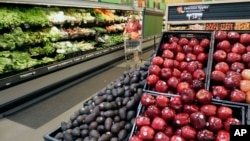The U.S. Food and Drug Administration (FDA) has proposed new rules aimed at making imported food safer. The FDA says the rules will hold importers accountable for observing the same safety standards as domestic producers.
The United States imports about 15 percent of its food from 150 countries, according to the FDA.
The agency currently relies on food safety inspectors at the border, who screen less than two percent of the products coming in. FDA Deputy Commissioner Michael Taylor says that’s changing.
“The big paradigm shift is the shift toward prevention, and for industry being responsible for documenting what they have done to prevent problems,” he said.
The FDA would require importers to examine their entire supply chains, from farm to shelf, and identify where the safety hazards are. Companies would need to document what they have done to control those hazards.
Taylor says the new rules will make food safer and not just in the United States.
“We are also directed to work with foreign governments to build their capacity to oversee food safety in ways that can strengthen food safety in their countries as well as in the United States,” he said.
For example, FDA capacity-building could help many developing-world governments that are involved in the spice industry, according to Cheryl Deem, executive director of the American Spice Trade Association. She says the industry has taken steps to control the hazards along its supply chains after recent disease outbreaks linked to spices. But she says some companies still have concerns.
“They want to be doing the right thing," Deem said. "They want to make sure they’re in compliance, but they’re concerned about the cost, and who’s going to bear that cost ultimately.”
The cost, and who bears it, still have to be worked out. The FDA estimates preventive controls could cost foreign companies between $300 million and $500 million in total.
But implementing the rules will also cost the agency about $500 million, and where that extra funding will come from is not clear. President Obama has proposed charging companies new fees to cover part of the costs. But many in the food industry oppose that idea.
It has been more than two-and-a-half years since Congress called for new food safety rules on imports. Since then, there have been outbreaks linked to imported mangoes, papayas, sesame tahini paste, pomegranate seeds and more, notes Sandra Eskin with the Pew Charitable Trusts advocacy group.
“These recent outbreaks just underscore the importance of these rules and how important it is to get them finalized as soon as possible," Eskin said. "The longer it takes, the more people will needlessly get sick.”
It will take at least 18 months for the rules to go through public comment and revision, and another year or more before they take effect.
The United States imports about 15 percent of its food from 150 countries, according to the FDA.
The agency currently relies on food safety inspectors at the border, who screen less than two percent of the products coming in. FDA Deputy Commissioner Michael Taylor says that’s changing.
“The big paradigm shift is the shift toward prevention, and for industry being responsible for documenting what they have done to prevent problems,” he said.
The FDA would require importers to examine their entire supply chains, from farm to shelf, and identify where the safety hazards are. Companies would need to document what they have done to control those hazards.
Taylor says the new rules will make food safer and not just in the United States.
“We are also directed to work with foreign governments to build their capacity to oversee food safety in ways that can strengthen food safety in their countries as well as in the United States,” he said.
For example, FDA capacity-building could help many developing-world governments that are involved in the spice industry, according to Cheryl Deem, executive director of the American Spice Trade Association. She says the industry has taken steps to control the hazards along its supply chains after recent disease outbreaks linked to spices. But she says some companies still have concerns.
“They want to be doing the right thing," Deem said. "They want to make sure they’re in compliance, but they’re concerned about the cost, and who’s going to bear that cost ultimately.”
The cost, and who bears it, still have to be worked out. The FDA estimates preventive controls could cost foreign companies between $300 million and $500 million in total.
But implementing the rules will also cost the agency about $500 million, and where that extra funding will come from is not clear. President Obama has proposed charging companies new fees to cover part of the costs. But many in the food industry oppose that idea.
It has been more than two-and-a-half years since Congress called for new food safety rules on imports. Since then, there have been outbreaks linked to imported mangoes, papayas, sesame tahini paste, pomegranate seeds and more, notes Sandra Eskin with the Pew Charitable Trusts advocacy group.
“These recent outbreaks just underscore the importance of these rules and how important it is to get them finalized as soon as possible," Eskin said. "The longer it takes, the more people will needlessly get sick.”
It will take at least 18 months for the rules to go through public comment and revision, and another year or more before they take effect.
